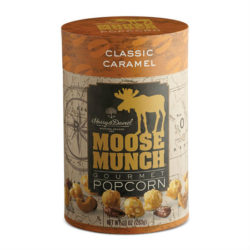Top Class Actions’s website and social media posts use affiliate links. If you make a purchase using such links, we may receive a commission, but it will not result in any additional charges to you. Please review our Affiliate Link Disclosure for more information.

The proposed class action lawsuit filed by plaintiff Bria Brown on Friday claims consumers – who can’t see into the non-transparent cylindrical boxes of Moose Munch Gourmet Popcorn – are tricked into thinking it’s nearly full.
Brown calls this deceptive packaging and alleges it amounts to illegal false advertising and consumer fraud.
Specifically, the plaintiff’s complaint says that the packages of Harry & David’s 10 oz. Moose Munch Gourmet Popcorn products in the Milk Chocolate, Dark Chocolate, Classic Caramel, and Cinnamon Maple Pecan flavors contain excessive empty space and violate rules set by the Federal Food Drug & Cosmetic Act as well as state consumer protection laws.
Harry & David’s Moose Munch Gourmet Popcorn products are packaged in transparent plastic pouches inside a non-transparent, cylindrical, thin cardboard box so that consumers cannot see the non-functional slack-fill in the container, the complaint states.
Brown says that the size of the thin cardboard boxes in comparison to the volume of the popcorn contained inside makes it appear as though consumers are buying more than what is actually being sold. The lawsuit points out that 43 percent, nearly half, of the gourmet popcorn package is slack-fill.
While some of Harry & David’s slack-fill may have functional justification related to packaging requirements, the company’s total slack-fill exceeds the amount necessary for this. The lawsuit argues this is proven by the fact that comparable gourmet popcorn products contain a significantly lower amount of non-functional slack-fill.
“Upon information and belief, Defendant sold and continues to sell the Products in containers made, formed, or filled as to be misleading and with non-functional slack-fill,” the lawsuit contends.
Slack-fill is an official Food and Drug Administration term for the empty space in a container that you can’t see into. According to FDA regulations, there are some legitimate reasons for slack-fill – including “protection of the contents” or “unavoidable product settling.” But if a company does not have one of these approved reasons, the slack-filled package is considered misleading.
As such, along with the FDA, regulatory agencies such as the Federal Trade Commission and various state attorney general’s offices, monitor manufacturers’ use of slack-fill and may take action against violators.
And so can consumers. In fact, several consumer class action lawsuits have been filed recently over the alleged deceptive slack-fill packaging of Raisinets, McCormick Black Pepper, Sour Patch Kids, and Swedish Fish.
Food makers aren’t the only companies accused of non-functional slack-fill. Companies like glue manufacturer Elmer’s have also been accused of misleading consumers of the actual content of their products.
Brown is seeking to represent a Class of “all New York residents who made retail purchases” of Harry & David’s Moose Munch Gourmet Popcorn “during the applicable limitations period” and is asking for compensatory and punitive damages in amounts to be determined by the Court or jury.
She is also requesting an injunctive order requiring Harry and David to repackage its Moose Munch Gourmet Popcorn products without non-functional slack-fill.
Brown is represented by C.K. Lee and Anne Seelig of Lee Litigation Group PLLC.
The Harry & David Moose Munch Gourmet Popcorn Class Action Lawsuit is Bria Brown v. Harry and David LLC, Case No. 1:17-cv-00999, in the U.S. District Court for the Southern District of New York.
ATTORNEY ADVERTISING
Top Class Actions is a Proud Member of the American Bar Association
LEGAL INFORMATION IS NOT LEGAL ADVICE
Top Class Actions Legal Statement
©2008 – 2024 Top Class Actions® LLC
Various Trademarks held by their respective owners
This website is not intended for viewing or usage by European Union citizens.















7 thoughts onHarry & David Class Action Says Moose Munch Popcorn Packages Underfilled
Add me
I bought these for gifts every year and have enjoyed them myself.
I call the company telling them that the cans was half full that was about 5-or 6 weeks ago never call me back
The Dark Chocolate Moose Munch is my absolute favorite! Sadly, 43 percent, nearly half, of the gourmet popcorn package is slack-fill. I wish some of these companies would stop with their deception.
I have noticed but continued to buy because, forgive me, that stuff is so darn Good!!, especially the classic Carmel, which I buy in numbers.
I’ve thought that for years, the Moose Munch tins were not legit! !
Harry and David are in Oregon, and kept moving their restaurant around. I have bought a ton of “The Moose” usually for Thanksgiving and Christmas Gifts.